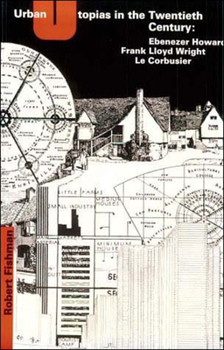Urban Utopias in the Twentieth Century: Ebenezer Howard, Frank Lloyd Wright, Le Corbusier
Select Format
Select Condition 
Book Overview
The utopian visions of three of urban planning's greatest visionaries. Ebenezer Howard, Frank Lloyd Wright and Le Corbusier, hated the cities of their time with an overwhelming passion. The metropolis was the counter-image of their ideal cities, the hell that inspired their heavens. In this book Robert Fishman examines the utopian visions of three of urban planning's greatest visionaries. Howard created the concept of the "garden city"...
Format:Paperback
Language:English
ISBN:0262560232
ISBN13:9780262560238
Release Date:September 1982
Publisher:MIT Press
Length:384 Pages
Weight:1.45 lbs.
Dimensions:0.8" x 6.2" x 9.3"
Age Range:18 years and up
Grade Range:Postsecondary and higher
Customer Reviews
2 ratings
AN ILLUMINATING SURVEY OF THREE VISIONARY URBAN PLANNERS
Published by Thriftbooks.com User , 14 years ago
In this 1977 book, Robert Fishman (historian of suburbia; see his other book, Bourgeois Utopias: The Rise And Fall Of Suburbia) has ably summarized the work of three pioneering modern urban planners: Ebenezer Howard (1850-1928; see his Garden Cities of To-morrow); Frank Lloyd Wright (1867-1959; see his books such as Frank Lloyd Wright and the Living City), and Le Corbusier (1887-1965; see his The City of To-morrow and Its Planning). Fishman begins by noting that "The utopian socialists were largely forgotten by the time Howard, Wright, and Le Corbusier began their own work, so there was little direct influence from them." Nevertheless, Fishman suggests that Howard may have been influenced by the work of Russian anarchist writer Peter Kropotkin, so that "he came to realize that the great city could never become the home of the cooperative civilization he was seeking. He was now ready to formulate the fundamental principle of the Garden City: Radical hopes for a cooperative civilization would be fulfilled only in small communities embedded in a decentralized society." About the aftermath of Howard's movement, Fishman says, "The Garden City movement, therefore, gradually lost its commitment to social change and became a city planning movement in the narrow sense. The sponsors of Welwyn Garden City no longer claimed to be initiating a revolutionary transformation in English society." Concerning Wright, Fishman states, "His fundamental tenet was that there must be no more distinction between urban and rural life-styles. Therefore, there must no longer be a physical separation between urban and rural areas." He says "Le Corbusier thus embraced and idealized precisely what most repelled Howard and Wright in the modern city: its contribution to the centralization of society." While reading the books of these three men themselves is still most helpful, Fishman's detailed summary of them is very useful, and this book is of considerable interest to those concerned with modern urban planning, Garden Cities, New Towns, etc.
Good subject matter, even better narrative
Published by Thriftbooks.com User , 19 years ago
Although an interesting subject matter, the author does an amazing job using the narrative of the thinkers lives to cooincide with their belief system, the only problem is he probably could have done it in about 50 pages less, but overall its a good fast read





